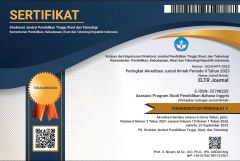STUDENTS’ PROFILES THROUGH LEARNING APPROACHES USING BIGGS’ STUDY PROCESS QUESTIONNAIRE
Abstrak terlihat: 644 / PDF terunduh: 739DOI:
https://doi.org/10.37147/eltr.v4i1.33Keywords:
learning approaches, study process questionnaire, students’ profiles.Abstract
A number of studies show that studenents' approaches to learning are important elements to achieve success. Learning approache provides perspectives on the characterisics of good learners. Using R-SPQ-2F (Biggs, Kember, & Leung, 2001), a revised version of Biggs'(1987) Study Process Questionnaire (SPQ), this study attempted to explore the learning approaches of first year students of 2013 academic year at the Faculty of Language and Literature, of Satya Wacana Christian University. The purpose of the study was to find out if there was a correlation between the students' approaches to learning and their achievement in the Integrated Course (IC), and the profile of their approaches to learning English in the first semester. From 151 respondents participated in this study, it was found that, although weak, there was a positive correlation between students’ achievement scores and Deep Approach and a negative correlation between their IC scores and Surface Approach. This study also found that Deep Motive was associated with the students' achievement. However, from the findings of the students' profile based on SPQ indicated that the study could not predict the students at risk. Other factors could have affected the students' achievement in their learning.
Downloads
References
Bernardo, A. B. (2003). Approaches to learning and academic achievement of Filipino students. The Journal of Genetic Psychology , 164 (1), 101-114.
Biggs, J. B. (1987). Study Process Questionnaire manual. Melbourne: Australian Council for Educational Research.Biggs, J. B. (1999). What the student does: teaching for enhanced learning. Higher Education
Research & Development , 18 (1), 57-75.
Biggs, J. B., Kember, D., & Leung, D. Y. (2001). The revised two-factor Study Process Questionnaire: R-SPQ-2F. British Journal of Educational Psychology , 71, 133–149.
Bliuc, A. -M., Ellis, R. A., Goodyear, P., & Muntele, D. (2011). Understanding student learning in context: Relationships between students’ social identity, approaches to learning, and academic performance. European Journal of Psychology of Education , 26, 427–433.
Carroll, John B. 1962. “The Prediction of Success in Intensive Foreign Language Teaching.” In Robert Glaser (ed.) Training Research and Education. Pittburgh: The University of Pittsburgh, pp. 87-136.
de Boot, K., Lowie, W., & Verspoor, M. (2005). Second Language Acquisition: An Advanced Resource Book. London: Routledge.
Dornyei, Z. (2005). The psychology of the language learner. Lawrence Erlbaum Associates, Inc.
Dörnyei, Z. (2005). The psychology of the language learner: Individual differences in second language acquisition. Mahwah, NJ: Lawrence Erlbaum.
Gass, S. M., & Selinker, L. (2008). Second language acquisition: An introductory course (3rd ed.). New York: Routledge.
Gijbels, D., Van de Watering, G., Dochy, F., & Van den Bossche, P. (2005). The relationship between students’ approaches to learning and the assessment of learning outcomes. European Journal of Psychology of Education, 4, 327–341.
Kember, D., Biggs, J. B., & Leung, D. Y. (2004). Examining the multidimensionality of approaches to learning through the development of a revised version of the Learning Process Questionnaire. British Journal of Educational Psychology , 74, 261–280.
Krashen, S. D. (1981). Second Language Acquisition and Second Language Learning. Pergamon Press Inc.
Lamb, M. (2007). The impact of school on EFL learning motivation: An Indonesian case study. TESOL Quarterly, 41(4), 757-780
López, B. G., Cerveró, G. A., Rodríguez, J. M., Félix, E. G., & Esteban, P. R. (2013, January 8). Learning styles and approaches to learning in excellent and average first-year university students. European Journal of Psychology of Education .
Masgoret, A.-M., & Gardner, R. C. (2003). Attitude, Motivation, and Second Language Learning: A Meta-Analysis of Studies Conducted by Gardner and Associates. Language Learning, 53(1), 123-163.
Phan, H. P., & Deo, B. (2007). The revised learning process questionnaire: A validation of a Western model of students’ study approaches to the South Pacific context using confirmatory factor analysis. British Journal of Educational Psychology , 77, 719–739.
Ramburuth, P., & McCormick, J. (2001). Learning diversity in higher education: A comparative study of Asian international and Australian students. Higher Education , 42, 333–350
Downloads
Published
How to Cite
Issue
Section
License
Copyright (c) 2020 Gusti Astika, Dian Toar Y. G. Sumakul

This work is licensed under a Creative Commons Attribution-ShareAlike 4.0 International License.











 ELTR Journal,
ELTR Journal, 